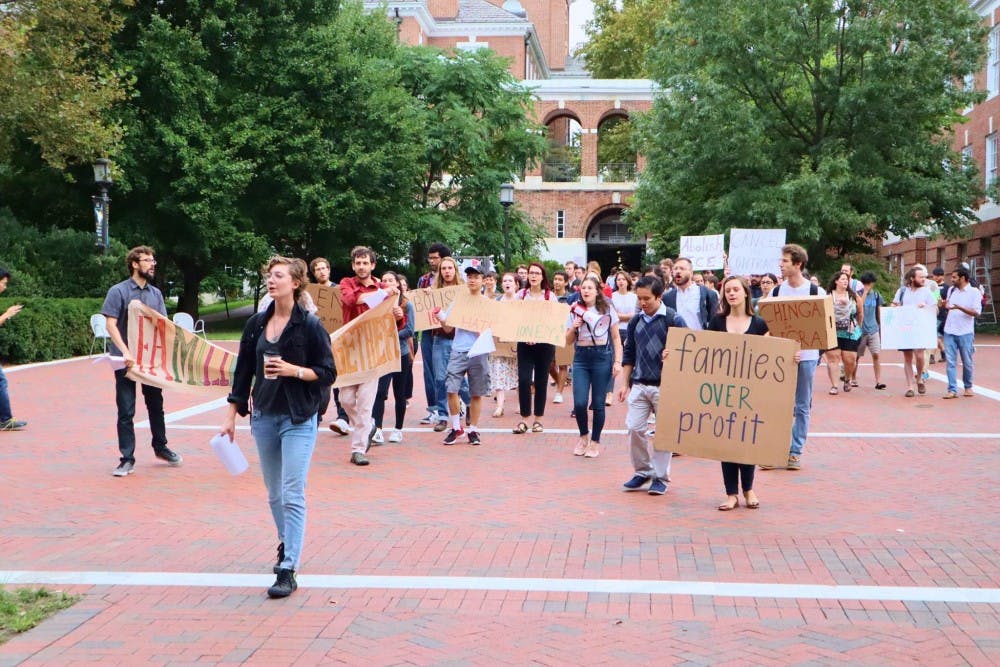Students, faculty and community members organized a protest and “playdate” on Friday, demanding that Hopkins end its multi-million-dollar contract with U.S. Immigration and Customs Enforcement (ICE).
Similar protest playdates have happened around the country where protesters are encouraged to bring their children to demonstrate that they stand in solidarity with families who have been separated at the U.S.-Mexico border.
Students Against Private Police (SAPP), Teachers and Researchers United (TRU), International Socialist Organization Baltimore and Party for Socialism and Liberation Baltimore co-organized the event.
Protesters marched from the Beach to Garland Hall, where several speakers addressed the crowd and explained why they opposed the JHU-ICE contract. The current contract provides funding for the Division of Public Safety Leadership (PSL) at the School of Education. PSL teaches management and leadership courses and workshops, including four non-credit workshops for ICE employees.
Protesters presented a petition with over 1,900 signatures to Vice Provost for Student Affairs Kevin Shollenberger, demanding that the University end the partnership.
Aimee Pohl, a Baltimore resident who helped organize the event, brought her son to the protest.
“[Hopkins] has a huge role in the Baltimore City community. It is a non-profit, it does not pay property taxes, it gets incredible advantages from the community, and it’s supposed to stand as a beacon of education and humane behavior
as a teaching hospital,” Pohl said.
Protesters chanted slogans such as “Say it loud, say it loud say it clear, immigrants are welcome here,” and “end the contract”.
Ed Mahoney read a statement written by his wife, Tamsyn Mahoney-Steel, who was forced to returned to the United Kingdom earlier this month after University officials failed to submit her visa application for renewal. Mahoney-Steele was given 10 days notice that the University would not be renewing her H-1B work visa and that she would therefore have to leave the country.
“Institutions like JHU are afraid of the consequences of standing up to the Trump administration’s change to the immigration regulations, and are sending back employees to their countries of origin,” Mahoney said.
Mahoney went on to emphasize that his wife was one of the luckier people to be denied a visa, as she has a mother to return to in the United Kingdom and a husband in the United States who is able to pack up her life here. In her statement, Mahoney-Steel wondered about what happens to individuals who do not have this same type of familial support.
She went on to emphasize that no one, regardless of race, education or socioeconomic status should be treated as she was.
“The often self-evident truth is that people of color, people who are poor, people without high levels of education, are the most discriminated against and the least supported,” she wrote. “For all of you that may be shocked by my situation, be more shocked for others, be angry for them, shout out for them, reach out to them like so many of you have reached out to me.”
Junior Kelvin Qian immigrated to the United States when he was three years old. He said that he attended the protest because he felt a commonality between himself and the migrant families trying to enter the U.S.
“For most of these governments and corporations who engage in human rights violations, there’s not much that you can do directly. But here at Hopkins, we are part of the Hopkins community as students, as affiliates, as graduate students, and some of us are professors,” he said. “We are directly connected to Hopkins so we have the most leverage upon Hopkins to get them to end this contract.”
Steph Saxton, a member of SAPP, helped organize the protest. According to Saxton, the event went well, as there were many non-affiliates in attendance alongside students, faculty and staff.
She explained the similarities between the anti-ICE movement and the anti-private police force movement.
“Right now, someone wants the geography of the United States to be without immigrants, brown or black folk,” Saxton said. “This is an attack on that, as much as private police force would also be an attack on the surrounding families in the neighborhood of Johns Hopkins.”
Graduate student, Valentina Dallona, who is also an immigrant, said that migrants rights is an issue that is very important to her.
“I am a worker in this institution and I feel very uncomfortable having my name and my life and my work connected to an institution that gets money from an institution like ICE, which goes completely against not only my politics, but my sense of human dignity and respect,” Dellona said.





